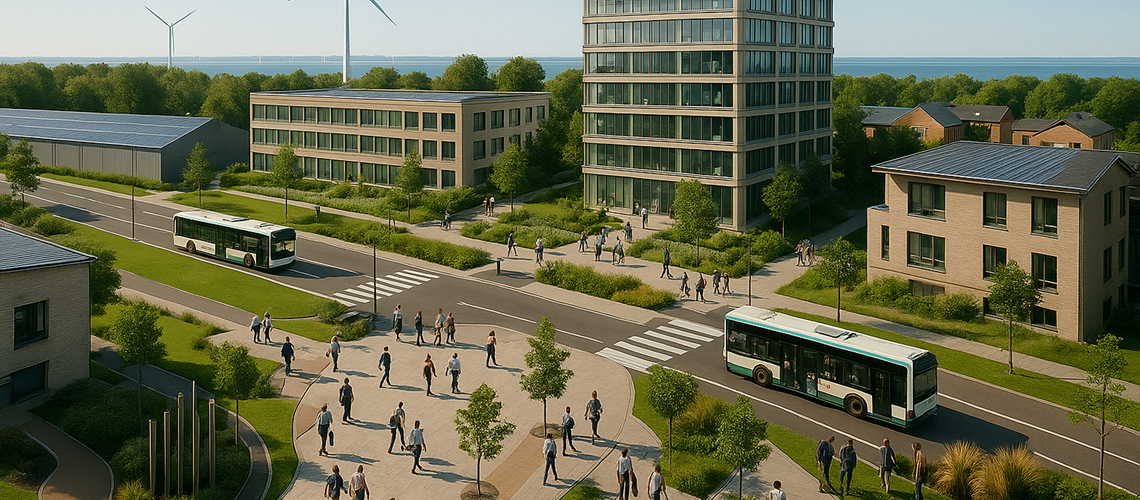Methodological Framework for PED Implementation in FLEXPOSTS
The aim of FLEXPOSTS (FLEXible energy POSitivity districTS) is to develop effective and replicable strategies to enhance the process of establishing PEDs. A major emphasis is placed on engaging stakeholders and developing innovative business models for flexible energy systems.
FLEXPOSTS will apply an interdisciplinary approach for integrating energy and urban planning. This approach is demonstrated in two demo sites, Zwette VI (Leeuwarden, the Netherlands), and Aalborg East (Aalborg, Denmark). In these demos, the lessons learnt and new insights from research will be translated to practice and vice versa.
This report outlines the methodological approach that will guide the analysis of how to implement PEDs in the two demo sites (D.3.1). This task should be seen in relation to the tasks of developing business models and PED implementation strategies (D3.2), together with the development of a replication toolkit (D3.3) that will be reported separately. The targeted audience of the report is the FLEXPOSTS consortium for internal knowledge sharing as well as the expert facility group of the JPI Urban Europe PED research program.
Reframing PEDs: From Tech Systems to Business Model Ecosystems
A new report explores how Positive Energy Districts (PEDs) can be seen not just as technical infrastructures, but as business model ecosystems — networks of stakeholders co-creating sustainable value.
By integrating financial, social, and environmental perspectives, the report highlights the importance of shared value creation, risk-sharing, and governance structures that ensure long-term collaboration. Mapping and aligning stakeholder incentives is key to designing viable models for sustainable urban energy.
Guiding texts for Business model ecosystems report
What new insights did you gain during the project?
The project highlighted that the a barrier to implementing Positive Energy Districts (PEDs) is not only technical feasibility but also the inability to capture and distribute all created value, especially social and environmental. This gap between value creation and value capture revealed the importance of ecosystem-wide business models that include non-financial values.
Which innovative work formats did you use (workshops, site visits, etc.—please provide dates)?
The methodology relied on structured analytical formats such as stakeholder mapping, value flow analysis, and scenario-based assessment.
Did you cooperate with other projects & programmes? If so, which?
The project was embedded in the FLEXPOSTS initiative under the JPI Urban Europe PED Programme. It aligns conceptually with the EU’s SET-Plan Action. It does not collaborate with other individual projects but did rely heavily on insights in the literature gained from other projects.
Work performed and main results achieved
The report developed a structured, multi-step methodology for identifying suitable business model ecosystems designs for PEDs based on stakeholder roles, value types, and risk-sharing. It concluded with several archetype business models, ownership types, and a monitoring framework.
The work performed in the project
Key activities included defining PED value types, mapping value distribution, identifying market failures, and proposing mechanisms for internalising externalities. It also analysed governance models and business model categories tailored to PEDs.
The results achieved
A complete step-by-step approach was designed to help planners implement viable PEDs. This includes tools for analysing stakeholder incentives, aligning shared goals, and developing adaptive governance and finance models.
Solutions and answers to the challenges
The main challenge—aligning multi-stakeholder incentives in the presence of non-monetised externalities—was addressed by expanding the definition of value beyond financial metrics. The report proposed hybrid ownership models and public-private cooperation as feasible solutions.
Progress beyond the state of the art and expected potential impact
The report advances PED implementation by systematically incorporating social and environmental values into business model design. This enables fairer and more realistic models for stakeholder cooperation.
The progress beyond the state of the art
It extends traditional business model thinking by introducing the concept of a business model ecosystem, shifting focus from single entities to interdependent stakeholder networks.
The impact of the project
The approach supports local authorities and developers in making investment decisions based on a comprehensive valuation of PED benefits. It lays the groundwork for replicable and scalable PED designs.
Expected (future) impact of your project
The methodology can be applied across European cities aiming to establish climate-neutral districts by 2030, helping to meet SET-Plan goals. It also informs national and municipal policy on energy infrastructure and urban sustainability.
Outlook & questions that may have arisen during the project and still need to be answered/solved
Open questions include how to formalise value-sharing agreements for indirect benefits and how to secure long-term public and private investment. Practical implementation of hybrid governance structures also requires further exploration.
(Potential) follow-up projects
Next steps include field-testing the methodology in pilot districts, integrating digital tools for stakeholder engagement, and exploring national financing schemes that reward positive externalities. Comparative studies across EU PEDs would help refine and validate the framework.
Planning principles for reducing energy consumption
Positive Energy Districts (PEDs) can play an important role in the energy transition for urban areas. Implementation of PEDs require that urban planning and energy planning processes are integrated.
So far PED research has predominantly been concerned with achieving an energy positive balance for urban districts and stakeholder engagement, whilst less attention has been paid to how urban planning measures can promote energy efficiency by reducing the energy demand.
In this short guide we outline 10 planning principles for how urban planning can contribute to reduce energy consumption and thereby support PED implementation.
Planning principles
- A dense urban structure can reduce urban sprawl and transport need
- An urban structure developed around neighbourhood centres can reduce transport need
- Brownfield redevelopment can support a dense urban structure and reduce urban sprawl
- Mixed use urban development can promote active forms of transportation and reduce transport need
- Transit-oriented development can promote the use of public transport
- Urban development around nodes in the public transport network can support the use of public transport
- Restrictions on car use can promote the use of public transport and active forms of transportation
- Small and dense housing units can reduce the heating need
- Green structures can reduce urban heat islands and energy consumption
- New urban development should be aligned with the existing infrastructures

